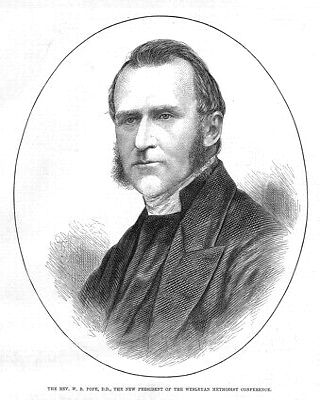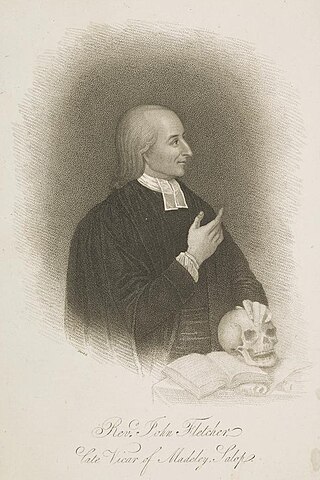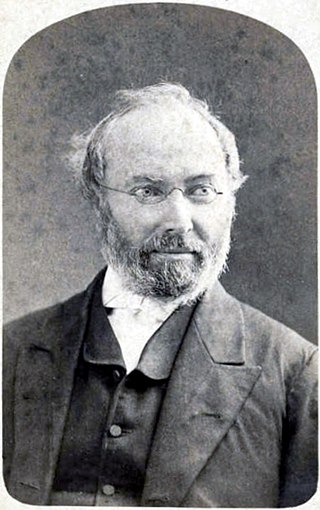
Arminianism is a movement of Protestantism initiated in the early 17th century, based on the theological ideas of the Dutch Reformed theologian Jacobus Arminius and his historic supporters known as Remonstrants. Dutch Arminianism was originally articulated in the Remonstrance (1610), a theological statement submitted to the States General of the Netherlands. This expressed an attempt to moderate the doctrines of Calvinism related to its interpretation of predestination.
Methodism, also called the Methodist movement, is a Protestant Christian tradition whose origins, doctrine and practice derive from the life and teachings of John Wesley. George Whitefield and John's brother Charles Wesley were also significant early leaders in the movement. They were named Methodists for "the methodical way in which they carried out their Christian faith". Methodism originated as a revival movement within Anglicanism with roots in the Church of England in the 18th century and became a separate denomination after Wesley's death. The movement spread throughout the British Empire, the United States and beyond because of vigorous missionary work, and today has about 80 million adherents worldwide.

The Church of the Nazarene is a Christian denomination that emerged in North America from the 19th-century Wesleyan-Holiness movement within Methodism. It is headquartered in Lenexa, Kansas. With its members commonly referred to as Nazarenes, it is the largest denomination in the world aligned with the Wesleyan-Holiness movement and is a member of the World Methodist Council.
The Wesleyan Church, also known as the Wesleyan Methodist Church and Wesleyan Holiness Church depending on the region, is a Methodist Christian denomination in the United States, Canada, the United Kingdom, South Africa, Namibia, Sierra Leone, Liberia, Indonesia, and Australia. The church is aligned with the Wesleyan-Holiness movement and has roots in the teachings of John Wesley. It adheres to Wesleyan-Arminian doctrine and is a member of the World Methodist Council.
Sanctification literally means "to set apart for special use or purpose", that is, to make holy or sacred. Therefore, sanctification refers to the state or process of being set apart, i.e. "made holy", as a vessel, full of the Holy Spirit of God. The concept of sanctification is widespread among religions, including Judaism and especially Christianity. The term can be used to refer to objects which are set apart for special purposes, but the most common use within Christian theology is in reference to the change brought about by God in a believer, begun at the point of salvation and continuing throughout the life of the believer. Many forms of Christianity believe that this process will only be completed in Heaven, but some believe that complete entire sanctification is possible in this life.

John Miley was an American Methodist Episcopal minister and theologian, who was one of the major Methodist theological voices of the 19th century.

Richard Watson (1781–1833) was a British Methodist theologian, a leading figure of Wesleyan Methodism in the early 19th century.

Within many denominations of Christianity, Christian perfection is the theological concept of the process or the event of achieving spiritual maturity or perfection. The ultimate goal of this process is union with God characterized by pure love of God and other people as well as personal holiness or sanctification. Other terms used for this or similar concepts include entire sanctification, holiness, perfect love, the baptism with the Holy Spirit, the indwelling of the Holy Spirit, baptism by fire, the second blessing, and the second work of grace.
J. Kenneth Grider was a Nazarene Christian theologian and former seminary professor primarily associated with the followers of John Wesley who are part of the Holiness movement.

The Wesleyan Quadrilateral, or Methodist Quadrilateral, is a methodology for theological reflection that is credited to John Wesley, leader of the Methodist movement in the late 18th century. The term itself was coined by 20th century American Methodist scholar Albert C. Outler.

William Burt Pope was an English Wesleyan Methodist minister and theologian, who was president of the Methodist Conference.

The governmental theory of the atonement is a doctrine in Christian theology concerning the meaning and effect of the death of Jesus Christ. It teaches that Christ suffered for humanity so that God could forgive humans without punishing them while still maintaining divine justice. In the modern era, it is more often taught in non-Calvinist Protestant circles, though Arminius, John Wesley, and other Arminians never spoke clearly of it. It is drawn primarily from the works of Hugo Grotius and later theologians such as John Miley and H. Orton Wiley.
Henry Orton Wiley was a Christian theologian primarily associated with the followers of John Wesley who are part of the Holiness movement. A member of the Church of the Nazarene, his "magnum opus" was the three volume systematic theology Christian Theology.

The moral influence or moral example theory of atonement, developed or most notably propagated by Abelard (1079–1142), is an alternative to Anselm's satisfaction theory of atonement. Abelard focused on changing man's perception of God as not offended, harsh, and judgmental, but as loving. According to Abelard, "Jesus died as the demonstration of God's love", a demonstration which can change the hearts and minds of the sinners, turning them back to God.

John William Fletcher was a Swiss-born English divine and Methodist leader. Of French Huguenot stock, he was born in Nyon in Vaud, Switzerland. Fletcher emigrated to England in 1750 and there he became an Anglican vicar. He began to work with John Wesley, becoming a key interpreter of Wesleyan theology in the 18th century and one of Methodism's first great theologians. Fletcher was renowned in Britain for his piety and generosity; when asked if he had any needs, he responded, "...I want nothing but more grace."
Mildred Olive Bangs Wynkoop was an ordained minister in the Church of the Nazarene, who served as an educator, missionary, theologian, and the author of several books. Donald Dayton indicates that "Probably most influential for a new generation of Holiness scholars has been the work of Nazarene theologian Mildred Bangs Wynkoop, especially her book A Theology of Love: The Dynamic of Wesleyanism." The Wynkoop Center for Women in Ministry located in Kansas City, Missouri, is named in her honour. The Timothy L. Smith and Mildred Bangs Wynkoop Book Award of the Wesleyan Theological Society also jointly honours her "outstanding scholarly contributions."

Wesleyan theology, otherwise known as Wesleyan–Arminian theology, or Methodist theology, is a theological tradition in Protestant Christianity based upon the ministry of the 18th-century evangelical reformer brothers John Wesley and Charles Wesley. More broadly it refers to the theological system inferred from the various sermons, theological treatises, letters, journals, diaries, hymns, and other spiritual writings of the Wesleys and their contemporary coadjutors such as John William Fletcher, Methodism's systematic theologian.

Thomas OsmondSummers was an English-born American Methodist theologian, clergyman, hymnist, editor, liturgist and university professor. He is considered one of the most prominent Methodist theologians of the nineteenth century.
Protestant theology refers to the doctrines held by various Protestant traditions, which share some things in common but differ in others. In general, Protestant theology, as a subset of Christian theology, holds to faith in the Christian Bible, the Holy Trinity, salvation, sanctification, charity, evangelism, and the four last things.
Jonathan Leonard Drury is an ordained minister in The Wesleyan Church of North America and an American theologian known for his contribution to Christology, Wesleyan Theology, Barthianism, Holiness Theology, and Protestant Theology. He is currently the Professor of New Testament and Spiritual Formation at Indiana Wesleyan University following his time as the Discipleship Pastor in their Spiritual Formation Office. He was also an Associate Professor of Theology and Christian Ministry at Wesley Seminary.











